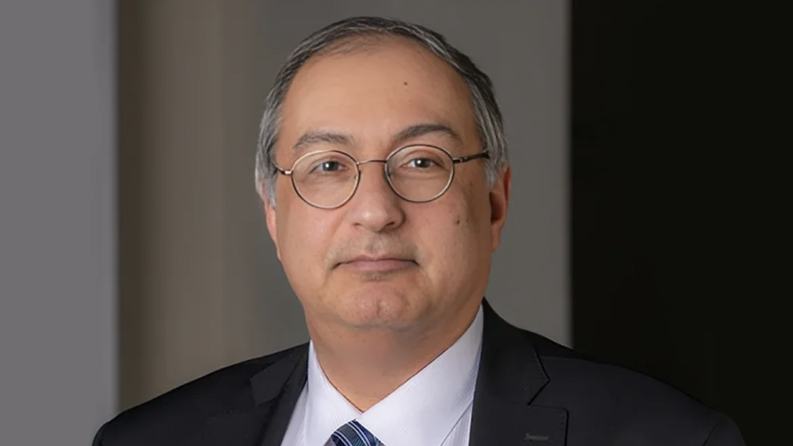
Wafik El-Deiry: Collaboration in US and Global Fight Against Cancer
Wafik El-Deiry, Associate Dean for Oncologic Sciences at the Warren Alpert Medical School and Director of the Legorreta Cancer Center at Brown University, shared a post on Substuck:
“The idea that such collaboration of this nature is critical to a healthy discovery and translation ecosystem is not new. I was inspired to write this after listening to the Cancer Decoded with Dr. Patrick Soon-Shiong and Mark Halperin interview with Senator Bill Cassidy that occurred on July 15, 2025.
First and foremost, I was truly impressed to learn some things about Senator Bill Cassidy. He is a gastroenterologist and hepatologist and represents the State of Louisiana at the US Senate. His wife who trained as a general surgeon and practiced for years is a cancer survivor who has lived with breast cancer.
Senator Cassidy impressed me as not just an elected leader in our country but also a knowledgeable, experienced and compassionate physician whose expertise is so important in the US Senate.
Dr. Cassidy has cared for patients and understands their journey and their difficulties. Importantly he has quite a bit of expertise as having done colonoscopies for cancer screening, and with his knowledge of cancer and how it is treated from the point of view of a hepatologist and otherwise as a trained physician.
As a specialist in the care of patients with colorectal cancer I appreciate the clinical care Dr. Cassidy has provided to patients and I would urge everyone to speak with their doctor about getting a colonoscopy if they have reached the age of 45. This would be done at a younger age if there are risk factors including family history of colon polyps or colon cancer.
I see Dr. Cassidy as a breath of fresh air who not only understands the issues patients face, the need for biomedical research and cancer research, but also the importance of the US as a world leader in medicine and medical breakthroughs.
Dr. Patrick Soon Shiong who helped moderate asked some important questions of Senator Cassidy so that the audience could understand much more about his background and perspective.
Dr. Soon Shiong expressed concern about progress being made in China in cancer treatment, technologies and clinical cancer trials. He mentioned that it is easier to develop and get drugs approved in China and these issues have been hindering progress and leadership in the US. He spoke about obesity, diabetes, metabolism and immune system as contributing to the cancer burden in the US. Weight loss, nutrition, overall health, and the immune system were viewed as relevant and important.
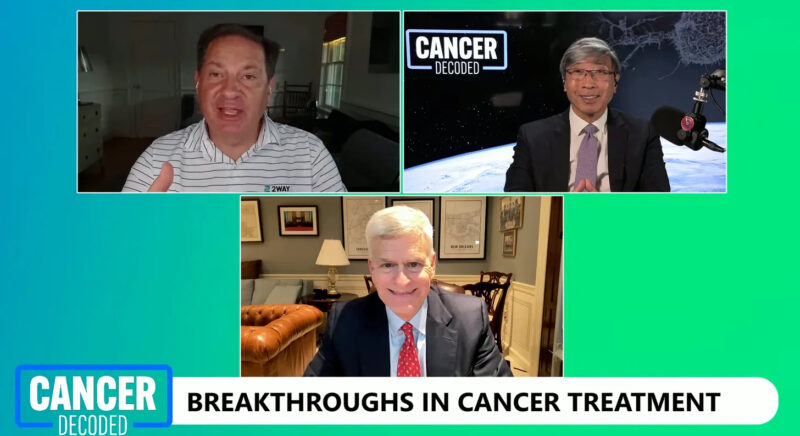
The side effects of chemotherapy were discussed as well as what has been happening in the field with new therapeutics that are not toxic to the immune system like chemotherapy but rather boost the immune system. This area has been of interest for Dr. Soon Shiong for years.
Reference was made to comments made recently by Dr. Makary, FDA Commissioner about immunotherapy that eliminates cancer as a promising approach that we need more of in the fight against cancer. Cancer treatment without chemotherapy and radiation that Dr. Soon Shiong described as ‘medical torture’ would be a path for the future.
It is important to acknowledge the transformation in cancer care that has been occurring for about 15 years, and the impact of basic science and clinical trials that preceded this. Nobel Prize winning research conducted by Professor Jim Allison and others revealed how the immune system is evaded by cancer and how to overcome this in the clinic. Work at the National Cancer Institute by Dr. Steve Rosenberg has for decades been demonstrating the life saving impact of cellular immunotherapies.
Work all around the US and globally by industry, academic institutions and Foundations like the Parker Institute for Cancer Immunotherapy and others have continued to pave the way towards progress.
However, much remains to be done given the current statistics of over 2 million new cancer cases in the US and over 600,000 deaths expected in 2025. We should celebrate the impact of research in cancer prevention, screening, and new treatments that have led to the nearly 20 million cancer survivors amongst us in the US.
Mark Halperin introduced Senator Cassidy as a hardworking, smart, kind individual who takes his responsibilities to the American people very seriously.
Senator Cassidy described the role of the federal government in the fight against cancer, if it is working correctly, as prime funder through NIH, that FDA controls access to drugs that it approves, to oversee protection of human subjects for ethical trials, to support medical education, and to address needs of uninsured patients on Medicaid as far as access to care—the federal government sets up a safety net to ensure access.
While I have never met Senator Cassidy on any of my trips to Capitol Hill over the last 20 Years, I think he is a wonderful leader and advocate for cancer research not only because he is an experienced physician but also as cancer has impacted his family very personally.
Dr. Soon Shiong focused on several topics around cancer including Senator Cassidy’s wife who has battled cancer, the need for someone in government who understands the challenges patients face especially in rural America, mention of the Big Beautiful Bill, disinformation, Medicare fraud, China including raw materials there.
Senator Cassidy spoke about his wife Laura’s experiences. He described her as someone who has the general surgeon’s intensity. She did her residency at UCLA in early 80’s before returning to Baton Rouge, LA. He said she was the first surgeon in Louisiana doing lumpectomies and minimally invasive surgeries to conserve the breast. She pursued innovation and remained patient-focused.
Senator Cassidy spoke about mammograms and challenges with cancer screening. He mentioned she used a ducto-scope to get breast milk samples from the ducts as a patient-focused innovation at a hospital with resources. Senator Cassidy indicated the importance of resources in medicine as far as what patients can access for their care.
Dr. Soon Shiong also trained at UCLA and was a member of the faculty there as a surgeon and had done some lumpectomies himself. Dr. Soon Shiong discussed care of patients with breast cancer in the 1980’s and 90’s with high dose chemotherapy with drugs such as taxol, and with radical mastectomies.
We have come a long way from very high dose chemotherapy and the scandals of bone marrow transplants for breast cancer. He spoke about Taxol developed by big pharma and how the package insert mentions that 2-4% of patients have anaphylactic reactions and fatal reactions despite premedication.
He attributed this to castor oil that was used for the solutions being injected into veins. He mentioned things that are added to drugs.
‘Innovation, evolution, enhancement of thinking through enlightenment can have impact. The opportunity to change things would be to not just take what pharma and FDA provide but to use understanding of cancer to develop better treatments.’ he said.
I should mention that the discovery and development of taxol goes back to the National Cancer Program and the NCI. I met some of the original clinical investigators during my Oncology Fellowship at Johns Hopkins back in the early 1990’s including Dr. Ross Donehower who was my Clinical Advisor in Medical Oncology and Dr. Eric Rowinsky who was a young faculty member at the time. Later in my career I met Dr. Susan B. Horowitz on a number of occasions and it was always a pleasure to hear her speak about taxol.
Senator Cassidy spoke about connections between obesity and risk of cancer from his perspective as a hepatologist and of course this is known from the population of patients with fatty liver, Non-Alcoholic Steato-Hepatitis or NASH that is associated with liver cancer.
Dr. Cassidy spoke about obesity as being more common in rural areas and areas where individuals from lower socioeconomic groups reside and how this leads to health care disparities when compared to suburban or urban areas.
He spoke about GLP’s and Ozempic and in a light-hearted moment gave an example of Jabba the Hutt who apparently at some point had lost a lot of weight but absolutely denied taking Ozempic. He was optimistic that addressing obesity will ultimately address disparities including in cancer incidence. He mentioned telehealth, AI as enabling medical practice and pharmacological innovations as things that will impact on rural healthcare including in cancer care.
There were several patient questions looking for specific answers and access to Dr. Soon Shiong’s clinical trials through ImmunityBio, with Anktiva, the Cancer BioShield Platform that in June received expanded Access approval from the FDA.
Dr. Shiong discussed his clinical research activity with the BioShield Platform with numerous clinical trials that are open to boost the immune system and Natural Killer cells to fight cancer or otherwise modulate the immune system in autoimmune diseases.
It was a pleasure for me to hear Dr. Soon Shiong‘s perspective on the importance of Natural Killer cells because my lab has worked on the innate immune system that uses Natural Killer cells for almost 30 years.
I believe in this powerful innate immunity that helps us all fight cancer and fight certain infections. Our research years ago discovered a protein called TRAIL Death Receptor 5 that sits in the cell membrane that Natural Killer cells take advantage of to kill cells that are transformed, cancerous or virally infected (but not normal cells).
We have spent the better part of the last 30 years studying this innate immune system, and over the last 18 years have worked on a drug we discovered to boost this innate immune system and Natural Killer cells to suppress cancer and its metastases.
The drug we discovered was known as TRAIL-Inducing Compound number 10 or TIC10 and then became known as ONC201 and most recently is called Dordaviprone.
In our pre-clinical studies over the last 15 years, the drug proved to have efficacy against a broad range of tumor types, including brain cancer, breast cancer, lung, cancer, colon cancer, lymphoma, and others such as prostate cancer or endometrial cancer. We knew from basic science studies that TIC10/ONC201 could cross the blood-brain barrier as a potential treatment for brain cancer.
Interestingly, when the drug went to clinical trials back in 2014, it showed a signal in a subset of patients with brain cancer, who were found to have a specific mutation known as Histone H3 K27M. This was completely unexpected. Seeing that human patients experience clinical responses after being treated by a small molecule first-in-class cancer therapeutic discovered in my lab has been one of the highlights of my academic career.
ONC201 was also shown to have activity against prostate cancer with bone and other organ metastasis in elderly men, activity against neuroendocrine tumors as well as endometrial cancer. Interestingly, some of the clinical results have demonstrated that the survival from progression of a patient’s cancer correlates with its immune boosting activity that involves immune cells, such as Natural Killer cells and others.
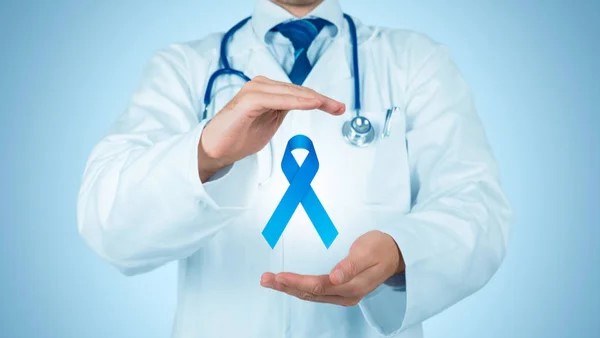
The amazing thing about the ONC201 drug is that it is a pill that can be taken by prescription and swallowed at home and the drug has been on track for FDA approval for several years. Among new drugs the toxicity has been minimal and manageable per all the cited clinical studies.
As an aside, and in the interest of disclosure, I co-founded the original company, Oncoceutics, Inc. that licensed the TIC10/ONC201 drug from academia. Oncoceutics, Inc. was acquired by Chimerix, Inc. in 2021 and Chimerix, Inc. was acquired by Jazz Pharmaceuticals in 2025.
This has been a story of basic science discovery, drug discovery, translation, entrepreneurship, and eventually a path towards regulatory approval. It has been a story of success in academia with collaboration between industry and government and private foundations.
Evidence has shown that this orally bioavailable ONC201 drug not only promotes Natural Killer cell recruitment into tumors, but also activates them so that they can help eliminate the tumor cells.
It has been fairly obvious to me for many years that such therapy could and should be tested in combination with cellular therapies including Natural Killer cells as well as numerous other therapeutics used in Oncology.
The process for drug development that starts in academia is slow and can take 10 to 20 years to succeed and certainly many if not most fail along the way. There are numerous hurdles along the way.
I hope to see, in the future, clinical trials investigating the ONC201 drug that was discovered in my lab and subsequent more potent imipridone analogs such as ONC206 or ONC212 or others in combinations with different targeted therapies, chemo-, radio- and immuno-therapies.
There is a lot we still do not know about the immune system and why it fails in curbing cancer growth, but it is exceedingly complex and requires national and global collaboration and cooperation on many levels.
There is an extremely well known relationship between immune suppression and cancer risk. Dr. Soon Shiong often refers to chemotherapy getting rid of the exact immune cells that are needed to eradicate cancer.
I have wondered about this too for many years but some clinical trials have shown that the combination of chemotherapy plus immunotherapy for example in lung cancer worked better than either alone.
Some of the exciting combinations my laboratory has uncovered include the combination of ONC201 or ONC206 imipridones with darolutamide for prostate cancer, the combination of various imipridones with lurbinectedin in lung or pancreatic cancer, the combinations with KRAS inhibitors and chemotherapeutics in gastrointestinal cancers such as pancreatic cancer or colorectal cancer.
Importantly, the novel mechanism of action of the imipridone class of drugs impacts on mitochondria by suppressing energy production and the drugs activate cell stress pathways that ultimately cause cells to stop generating new proteins needed for growth and survival and so the cancer cells stop growing or die.
ONC201 targets cancer stem cells which are more difficult to eradicate by chemotherapy and are often responsible for tumor relapse. Such an effect on the biology of cancer stem cells and genes they express to maintain their ‘stemness’ is an important property and mechanism of this novel class of cancer therapeutics.
I have been asking questions for many years about what happened in the clinic with these drugs as compared to what we have been learning in the lab for almost 2 decades, including various cell culture and in vivo studies. Because the innate immune system targets all kinds of cancers it was difficult for me to understand why the ONC201 drug or class of drugs was not more effective across tumor types as a single therapy. An insight is that certain therapy resistance or immune evasion mechanisms remain to be discovered and that would help achieve more benefit for patients.
The history of cancer drug development in Oncology going back to the days after World War II when nitrogen mustard was found to have anti-tumor effects, has been of combination chemotherapy using drugs with different mechanisms of action and ideally non-overlapping toxicities.
Such approaches have led to cure for testicular cancer. Lance Armstrong is a great example of a patient who had testicular cancer with brain metastasis and was cured. There have been cures of lymphoma going back many decades now and while immunotherapy has certainly been an incredible breakthrough, most patients are not alive at five years and so much work remains to be able to have better patient survival across the deadliest cancers. Many including political figures such as Ted Kennedy and John McCain who were on both sides of the political divide succumbed to brain cancer.
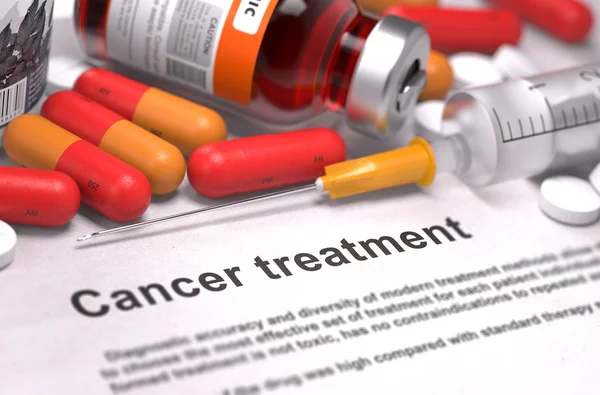
There has been quite a lot of press describing successes with immunotherapy in diseases such as Lynch Syndrome where patients inherit a defect in DNA repair and so they make a lot of proteins whose sequence code is altered and so they are recognized as foreign by the immune system. Immunotherapy has been effective in blocking the mechanisms by which such tumors block the immune system in the clinic going back at least 15 years.
Very exciting data over the last 3 or 4 years has shown that such patients if they have rectal cancer that is locally advanced and treated with immunotherapy for example have had tumors disappear allowing then to avoid life-altering rectal cancer surgery altogether.
However, as was mentioned at this interview, by Senator Cassidy, the patients who benefit represent only around 6%. It may be a little higher at 10% or even higher at 15% considering that not all cases involve Lynch Syndrome, but some occur sporadically in the general population with the DNA repair defects.
This is very exciting progress, and I would never mean to diminish the extraordinary advances, but there is so much work that remains to be done for the more difficult to treat cancers and with regard to extending long-term patient survival.
We must take a more holistic approach to understanding cancer biology, cancer causes, and novel prevention and treatment strategies. We must understand and work to prevent environmental exposures, and it’s time to address lifestyle especially among young people who develop metabolic syndrome from obesity. We have made a lot of progress with reducing smoking but many still smoke in the US and even more around the world.
It has become clear over many years that there will be no one size fits all. It is also clear that some cancers at some point become so advanced that physicians can only offer comfort. Having said that there are certainly examples of miraculous recoveries of patient who were near the end of life due to advances in precision oncology. I have experienced this first hand in my clinic as a physician-scientist and practicing medical oncologist.
The discovery of a mutation in a patient’s tumor through biomarker testing can immediately point the way towards a life-prolonging available treatment. This is not science fiction. This is what drugs like gleevec, BRAF inhibitors, inhibitors of NTRK fusions, Ret inhibitors and drugs like belzutifan have achieved for patients whose tumors were predicted to be responsive.
Much progress has also been achieved with CAR-T therapies both through academic research and by numerous pharmaceutical companies. Exciting progress is being reported with the use of different kinds of vaccines for preventing recurrence of deadly kidney or pancreatic cancers.
I have previously said that precision oncology is the future of cancer care because this is in the tradition of medicine in general to provide patients with a management plan and treatments that are completely tailored to their illness, or risks based on family history and/or personal genomics.
Moreover, a whole new world of screening opens up with specialized blood tests that are becoming more and more sensitive and specific for helping diagnose cancer at its earliest stages when it can be cured, or in monitoring response to treatment and/or emerging treatment resistance mechanisms.
Humans have evolved a sophisticated immune system that involves many cell types. What has been becoming more and more clear is that an emerging growing cancer co-opts the body and the immune system to their advantage.
Not only do the cancer cells have ways of directly block the killing activity of cytotoxic Killer T-cells, and Natural Killer cells, but the cancer cells also secrete substances that diminish immunity.
Tumor cells create an immune suppressive, so-called tumor microenvironment. This involves some immune suppressive cells known as T-regs and so called myeloid-derived suppressor cells. In recent years, there has been a lot of interest in what neutrophils and macrophages do and how they impact cancer development and interfere or help with cancer therapy.
For example, macrophages can form a shield around growing cancers that creates pressures and shields the tumors by blocking the ability of treatments, such as chemotherapy, to enter the tumor.
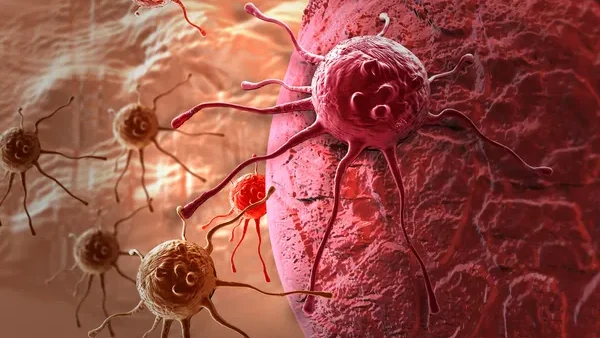
Macrophages also can undergo a metamorphosis from the normal form known as M1 that eats foreign objects, including cancer cells, to an M2 form that promotes cancer growth, and is also part of the immunosuppressed state within the tumor microenvironment.
My laboratory has become interested in what macrophages are doing in brain cancer, and in fact, one of my graduate students by the name of Tyler Roady has taken this up as his thesis project at Brown University.
It turns out that brain tumors have a lot of macrophages in them, and that these macrophages deserve our attention in the development of novel therapeutic strategies.
There are already agents in the clinic that block macrophages, and we think many more will be needed in the future, including in combination with other types of cancer therapy. Coming back to on ONC201, ONC206 and other imipridones and their activities against brain cancer, we have gained some important insights.
We have found very interesting combinations of these drugs with EZH2 inhibitors or EZH1/2 inhibitors or HDAC inhibitors result in synergies in the killing of brain tumor cells, including diffuse gliomas with H3 K27M mutations. The EZH2, EZH1/2 inhibitors or HDAC inhibitors are approved epigenetic drugs used to treat various cancers including some brain cancers.
These efforts were targeted at understanding more about why that H3 K27M mutations matter or are correlated with the sensitivity of certain brain tumors to this imipridone class of drugs. What we discovered is that these combinations result in more killing not just of tumor cells with the H3 K27M mutations but other glioblastoma cells without the mutations and in fact other non-brain tumor cancer cells.
Interestingly, we also discovered over the last couple of years that these orally available imipridone drugs suppress the expression of EZH1 and EZH2 proteins in many types of cancer cells. EZH1 and EZH2 are cancer promoting genes that impact on cancer development, progression, cellular plasticity and therapy resistance.
In fact, we discovered last year and published earlier this year in 2025 that the imipridones also suppress expression of a gene known as MGMT which when expressed causes brain tumor cells to be resistant to temozolomide (Temodar) that is the main stay of brain tumor therapy in combination with radiation. Thus, we are moving in the direction of looking at these effects in more basic and clinical research in order to be able to help more patients.
We have had efforts looking at tumor treating fields (TTFields) that was mentioned by Dr. Patrick Soon Shiong and his colleague at HOAG. We have uncovered novel findings related to how this treatment stimulates the immune system as well as cell stress pathways as occurs with the imipridone drugs for a few years.
We have been conducting pre-clinical experiments, including in mice, looking at combinations of TTFields with different kinds of anti-cancer drugs including PARP inhibitors or KRAS inhibitors, and we would agree with Dr. Soon Shiong that TTFields represent an important part of the armamentarium to treat cancer in 2025 and this is now extending beyond brain tumors and lung cancer to pancreatic cancer in the clinic and other cancers that are still at the stage of pre-clinical testing.
It is exceedingly important to recognize that there is a lot of exciting progress, new knowledge, pre-clinical and clinical results that are emerging, and that cancer is an area where colleagues and competitors can and should work together, and this includes on the global stage.
International non-profits such as the WIN Consortium offer a good example for how innovation, collaboration and global impact can push the frontiers of discoveries and clinical practice.
As complicated as the solutions will be, this is also an opportunity for experts to use their skills in integrating new knowledge and new treatments into the vision and impact of the field of precision oncology to try and help each and every patient.
An exciting future is one where cancer is prevented, detected early, the public knows and avoids, with the help of government and those who deliver healthcare, exposures and lifestyles that increase risk of getting cancer.
As Dr. Makary mentioned recently in an interview, we need more life-saving and life-prolonging treatments including those that leading to a pathologic complete response and including treatments for advanced cancer. This can be transformational where patients can avoid life-altering surgeries or years of toxic treatments. Patients with cancer and the growing number of cancer survivors in the US and globally are healthier productive members of society who understand and appreciate the scientific progress that has been made over decades.
The fruits of progress from investments made over the better part of the last century in NIH and NCI are reflected in the growing number of cancer survivors and in the progress made in preventing and treating cancer. We need to continue the investments so we can do better in bringing discoveries to help patients with cancer and those at risk for cancer and to continue to lead the world in these discoveries and treatments.
An America First agenda under the Trump Administration means investing more in the NCI. We must as the greatest nation on earth forge a path towards building on decades of accomplishments that have demonstrated incredible and measurable outcomes in science and medicine. There is an urgency that everyone touched by cancer through personal experience, a loved one, friend or caregiver understands well.”
More posts featuring Wafik El-Deiry.
-
Challenging the Status Quo in Colorectal Cancer 2024
December 6-8, 2024
-
ESMO 2024 Congress
September 13-17, 2024
-
ASCO Annual Meeting
May 30 - June 4, 2024
-
Yvonne Award 2024
May 31, 2024
-
OncoThon 2024, Online
Feb. 15, 2024
-
Global Summit on War & Cancer 2023, Online
Dec. 14-16, 2023
